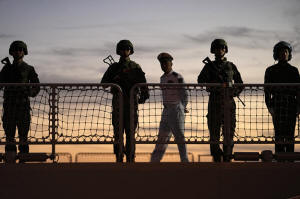China, Iran and Russia hold joint naval drills in Mideast as tensions
rise between Tehran and US
[March 12, 2025]
By NASSER KARIMI and JON GAMBRELL
TEHRAN, Iran (AP) — China, Iran and Russia conducted joint naval drills
Tuesday in the Middle East, offering a show of force in a region still
uneasy over Tehran's rapidly expanding nuclear program and as Yemen's
Houthi rebels threaten new attacks on ships.
The joint drills, called the Maritime Security Belt 2025, took place in
the Gulf of Oman near the strategic Strait of Hormuz, the narrow mouth
of the Persian Gulf through which a fifth of all crude oil traded
worldwide passes. The area around the strait in the past has seen Iran
seize commercial ships and launch suspected attacks in the time since
President Donald Trump first unilaterally withdrew America from Tehran's
nuclear deal with world powers.
The drill marked the fifth year the three countries took part in the
drills.
This year’s drill likely sparked a warning late Monday from the British
military’s United Kingdom Maritime Trade Operations center, which said
there was GPS interference in the strait, with disruptions lasting for
several hours and forcing crews to rely on backup navigation methods.
“This was likely GPS jamming to reduce the targeting capability of
drones and missiles,” wrote Shaun Robertson, an intelligence analyst at
the EOS Risk Group. “However, electronic navigation system interference
has been reported in this region previously during periods of increased
tension and military exercises.”
China and Russia in Mideast waters patrolled by U.S. Navy
Russia's Defense Ministry identified the vessels it sent to the drill as
the corvettes Rezky and the Hero of the Russian Federation Aldar
Tsydenzhapov, as well as the tanker Pechenega. China's Defense Ministry
said it sent the guided-missile destroyer Baotou and the comprehensive
supply ship Gaoyouhu. Neither offered a count of the personnel involved.

Neither China nor Russia actively patrol the wider Middle East, whose
waterways remain crucial for global energy supplies. Instead they
broadly cede that to Western nations largely led by the U.S. Navy's
Bahrain-based 5th Fleet. Observers for the drill included Azerbaijan,
Iraq, Kazakhstan, Oman, Pakistan, Qatar, South Africa, Sri Lanka and the
United Arab Emirates — with the Americans likely keeping watch as well.
However, both China and Russia have deep interests in Iran. For China,
it has continued to purchase Iranian crude oil despite facing Western
sanctions, likely at a discount compared to global prices. Beijing also
remains one of the top markets for Iranian imports.
Russia, meanwhile, has relied on Iran for the supply of bomb-carrying
drones it uses in its war on Ukraine.
[to top of second column]
|

Chinese navy troops attending a joint naval drill with Iran and
Russia stand on the deck of their warship in an official arrival
ceremony at Shahid Beheshti port in Chabahar in the Gulf of Oman,
Iran, Tuesday, March 11, 2025. (AP Photo/Vahid Salemi)

Iran highlights drills to boost public support after Israeli
attack
The drills marked a major moment for Iran's state-run television
network. It's aired segments showing live-fire during a night drill
and sailors manning deck guns on a vessel. The exercises come after
an Iranian monthslong drill that followed a direct Israeli attack on
the country, targeting its air defenses and sites associated with
its ballistic missile program.
While Tehran sought to downplay the assault, it shook the wider
populace and came as a campaign of Israeli assassinations and
attacks have decimated Iran's self-described “Axis of Resistance” —
a series of militant groups allied with the Islamic Republic. Syrian
President Bashar Assad was also overthrown in December, further
weakening Iran's grip on the wider region.
All the while, Iran has increasingly stockpiled more uranium
enriched at near weapons-grade levels, something only done by
atomic-armed nations. Tehran has long maintained its program is for
peaceful purposes, even as its officials increasingly threaten to
pursue the bomb.
Iran's nuclear program has drawn warnings from both Israel and the
U.S. that it won't allow Tehran to obtain a bomb, signaling military
action against the program could happen. But just last week, Trump
sent a letter to Iran’s Supreme Leader Ali Khamenei, seeking a new
nuclear deal with Tehran. Iran says it hasn't received any letter,
but still issued a flurry of pronouncements over it.
Yemen's Houthis renew threats to Mideast waterways
As a shaky ceasefire holds in Israel's war against Hamas in the Gaza
Strip, Yemen's Houthi rebels said they were resuming attacks on
shipping in the Red Sea, the Gulf of Aden and the Bab el-Mandeb
Strait that connect the two waterways.
The rebels' secretive leader Abdul-Malik al-Houthi warned Friday
that attacks against Israel-linked vessels would resume within four
days if Israel didn't let aid into Gaza. As the deadline passed
Tuesday, the Houthis said they were again banning Israeli vessels
from the waters off Yemen. Although no attacks were reported, it has
put shippers on edge. The rebels had targeted over 100 merchant
vessels with missiles and drones, sinking two vessels and killing
four sailors.
___
Gambrell reported from Dubai, United Arab Emirates.
All contents © copyright 2025 Associated Press. All rights reserved |